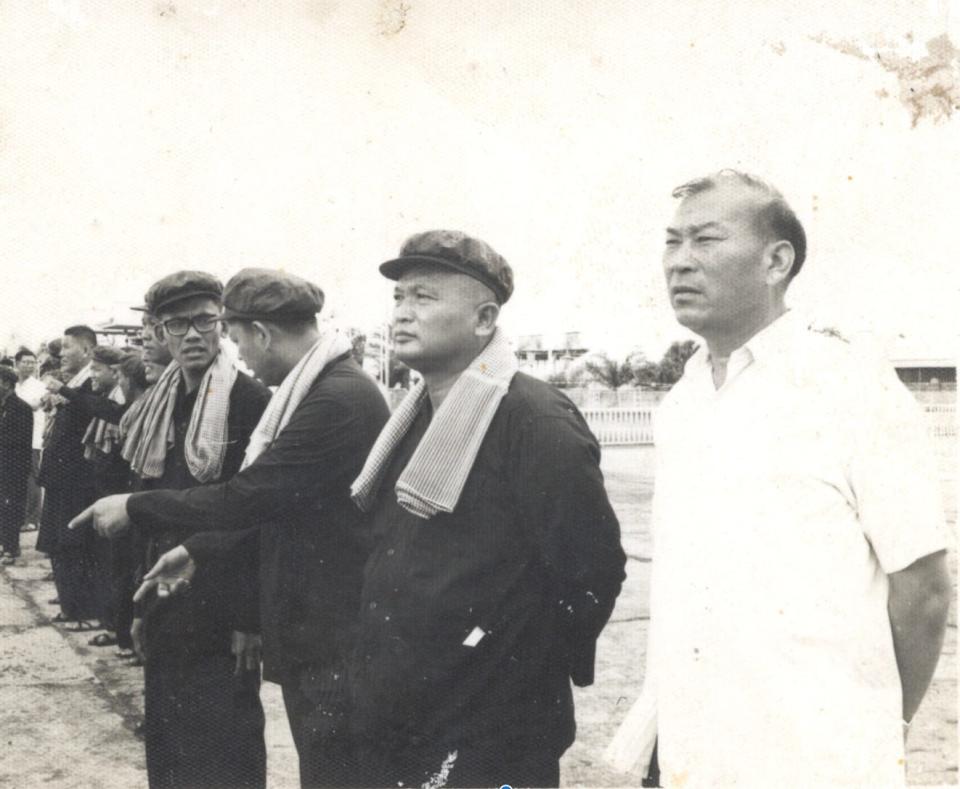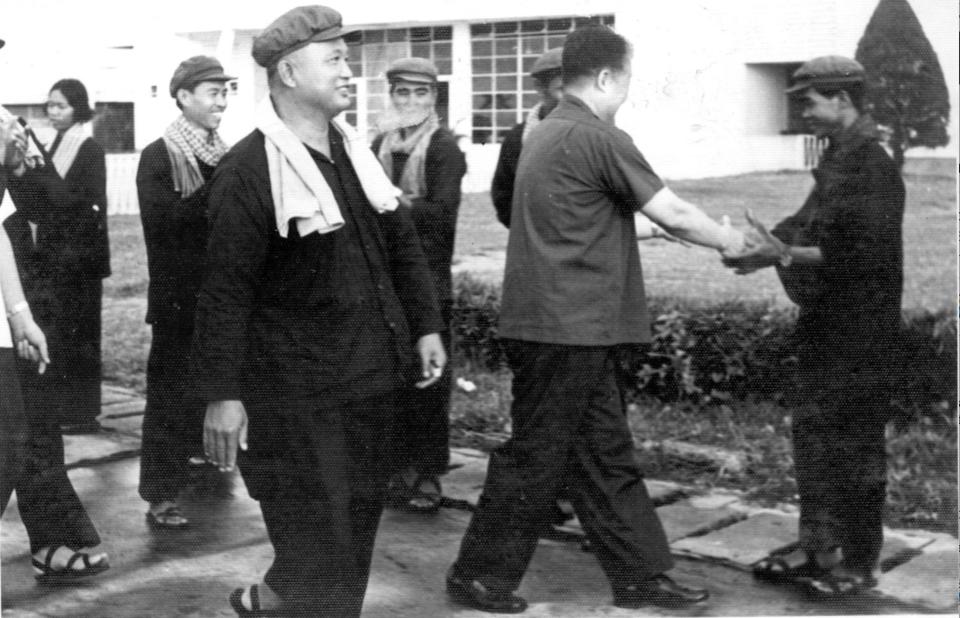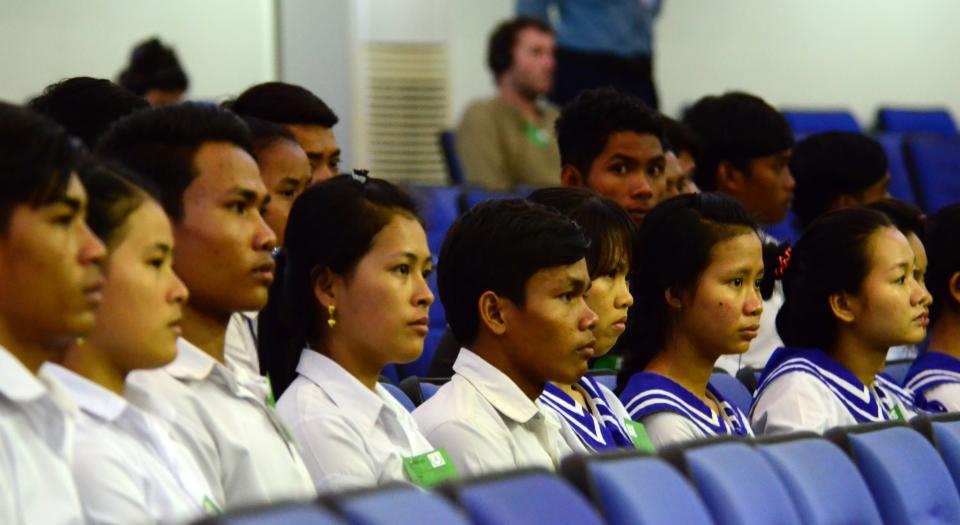Nuon Chea, architect of bloody Khmer Rouge policy, dead at 93 in Cambodia

Nuon Chea, a chief architect of Cambodia’s bloody Khmer Rouge regime, died at a hospital in the capital Phnom Penh on Sunday at the age of 93. He was serving a life sentence for genocide and crimes against humanity.
His death in a hospital was confirmed in a statement by the Extraordinary Chambers in the Courts of Cambodia (ECCC), commonly known as the Khmer Rouge Tribunal. No cause of death was given.
Chea, who was known as “Brother No. 2,” is credited with designing Khmer Rouge ideology and policy, and was second in command to the regime’s infamous leader Pol Pot. An estimated 1.2 to 2.8 million Cambodians died from starvation, disease and execution during their rule from 1975 to 1979.
Cambodian political analyst Ou Virak took to social media to recall his meeting with Chea in 2005, prior to his arrest.
“He was then, and I am assuming until his death, has had little regret or remorse [for the] atrocities he was responsible for,” he wrote, adding that Chea deflected blame to “Vietnamese infiltrators” and “internal enemies,” a common refrain the Khmer Rouge used to justify their actions during their rule and later in court.
The Khmer Rouge came to power on April 17, 1975, just days after the United States evacuated the last of its forces and diplomats from Phnom Penh and days before the Saigon airlift in neighboring South Vietnam. Following years of bloody conflict and U.S. bombings of the neutral country that surpassed the tonnage dropped on Europe during World War II, the Khmer Rouge attempted to construct an ultra-Maoist agrarian communist utopia.

Cities were forcibly evacuated and the population was put to work on collective farms and building massive infrastructure projects that cost thousands of lives. Gross mismanagement led to starvation and disease, and thousands were killed in paranoid purges aimed at rooting out “internal enemies” to the regime. Ethnic Vietnamese and Muslim Cham minorities suffered targeted killings, from which genocide charges against Chea stem.
“He never once blamed his own ideology or the movement he helped create. He boasted the fact he's the one that chose 'brother #1' Pol Pot,” Virak wrote.
Despite Virak’s own father being executed by the Khmer Rouge, he said that in Chea he saw an old man who lived a life of tragic mistakes and “full of anger and fear.”
“Is it time to move on?" he asked.
For many Cambodians, the answer is no.
Among them, Youk Chhang, executive director of the Documentation Center of Cambodia (DC-Cam), a research non-profit that provided evidence to the United Nations-backed Khmer Rouge Tribunal. Chhang lost his father and half of his siblings. He was 14 years old in 1975, and was put to work at the worksite of the Trapeang Thma reservoir dam, which claimed as many as 30,000 lives.
“Justice was not properly delivered,” he told USA TODAY in a phone interview from Phnom Penh in which he reflected on the split reactions he’s observed.
“People I met today on the street … some people start out by cursing him … but I also encounter people who feel that we should put it down, you know, move on,” he said, before adding “people such as myself are still in search for closure from what he did to all of us.”
Recalling life during the regime, Chhang said to imagine four years without soap, a toothbrush or toothpaste, no change of clothes, a few spoonfuls of water a day during the dry season, and nothing to eat except a bowl of porridge made from a few grains of rice.
“You’re no longer afraid of ghosts, because ghosts are everywhere, dead bodies everywhere,” he said.
Chea remained a part of the Khmer Rouge well after the 1979 Vietnamese-backed invasion of Cambodia toppled the regime. Civil war dragged on until 1998 after the handful of surviving commanders surrendered their stronghold in the northwest corners of the country. Between 1975 and 1994, the United States accepted nearly 150,000 Cambodians as refugees.

For a time Chea lived modestly with his family in the western province of Pailin. It was there that he gave one of his few video-recorded interviews with Cambodian journalist Thet Sambath in the making of his 2009 documentary “Enemies of the People.”
“Are you sorry for those who were killed?” Sambath asks him, to which Chea responds, “I have no regrets.”
He was arrested on Sept. 19, 2007, following the establishment of the United Nations-backed ECCC, known as the Khmer Rouge Tribunal.
The court sentenced him to life imprisonment in August 2014 for crimes against humanity, and again in November 2018 for genocide, crimes against humanity and grave breaches of the Geneva Convention. He was sentenced alongside the Khmer Rouge head of state Khieu Samphan.


Chea remained defiant and unrepentant until the end. His defense at the tribunal consisted mainly of attacking the integrity of the institution. The court has come under fire for being inefficient, costing some $300 million over a decade yet only sentencing three individuals. It has also been plagued by allegations of political interference from Cambodia’s current government that is led by former Khmer Rouge commander Hun Sen.
“It certainly appears that he sleeps peacefully. But, you know, you can't help crazy. I mean, crazy mass murderer in this case. It just is so difficult to think about it,” says Sophal Ear, a Cambodian refugee who is now a professor of Diplomacy and World Affairs at Occidental College in California.
“As a Buddhist, I believe he will be reborn and he'll be reborn in into a s----- life as a result of what he did,” he added.
For Chhang, the dehumanizing effect of political power remains Chea’s lasting legacy.
“You no longer see your people as people, you see them as the enemy and you are willing to eliminate them just to retain your power,” he said.
Alessandro Marazzi Sassoon reported on the Khmer Rouge Tribunal for two years in Cambodia. He is now a reporter at FLORIDA TODAY.
Contact him at 321-355-8144
or asassoon@floridatoday.com
Twitter: @alemzs
This article originally appeared on Florida Today: Nuon Chea, policy architect of Cambodia's Khmer Rouge, dead at 93

